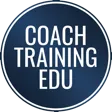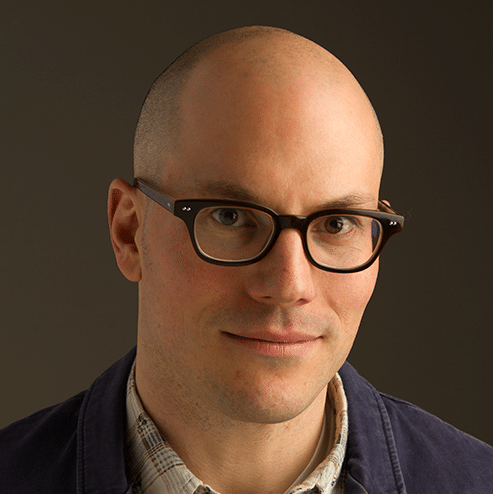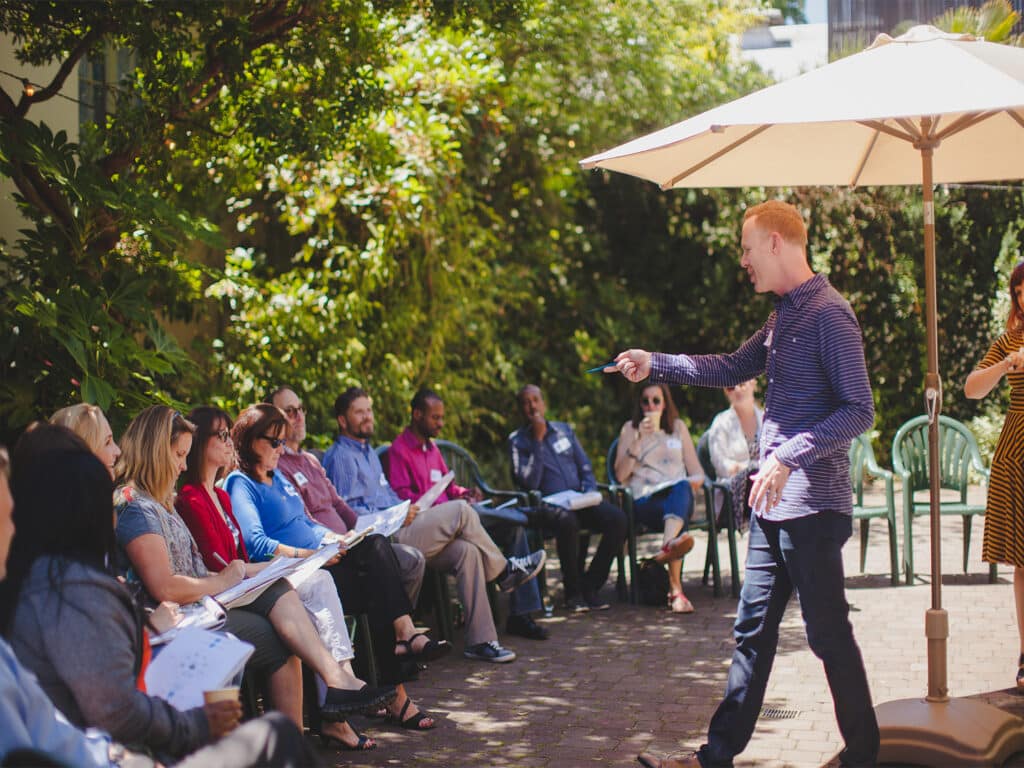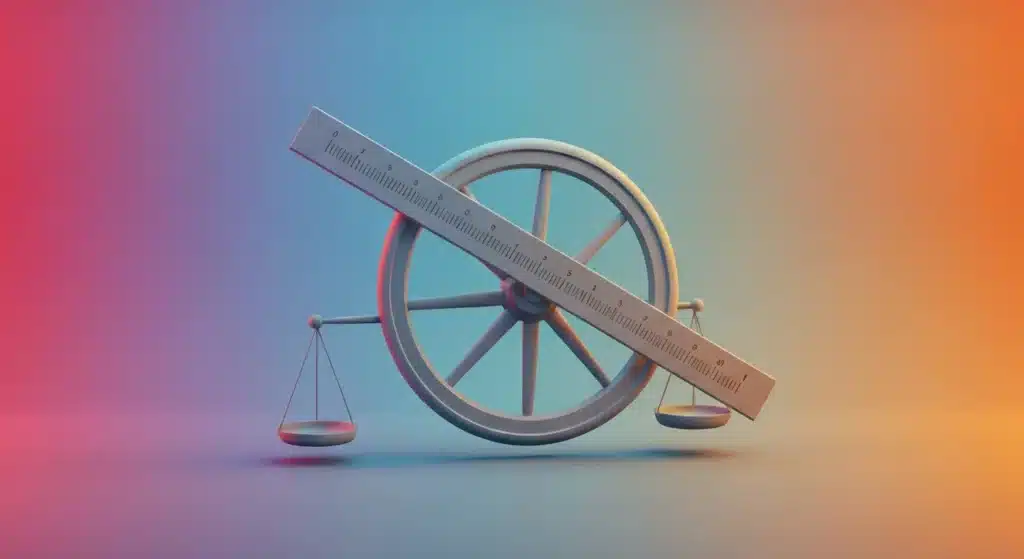Listen to Podcast
Be Curious!
Raj Anderson and guest experts answer your coaching questions each week!
In Coaching to Flourish #078, we explore the roles of empathy vs sympathy within coaching, how to set better boundaries, and discovering opportunities for learning for both ourselves and our clients.

Live Transcript (Edited for clarity)
[Raj Anderson] Welcome everyone to the Coaching to Flourish podcast. And I’m your host, Raj Anderson, executive life coach and coach assessor, and I’m excited to be here with John Andrew Williams, who’s the founder of Coach Training EDU. What’s the weather like there for you, John?
[John Andrew Williams] It’s glorious. It’s just been amazing day after day. It was rainy a little bit, but it’s summertime here, or almost summertime. So it’s been a really lovely spring.
[Raj Anderson] And do you feel ready for the summer?
[John Andrew Williams] Yeah. It’s like the sprint, the spring sprint, to get all the irrigation in order, to get all the plants looking… and this is the first spring where I was able to get ahead of it and have everything on irrigation that I want to have on irrigation. We’ve talked about like the systems of irrigation, the metaphor of system of irrigation on things. And this is the first year where I have it 90%, 95% of the things on irrigation. There’s just one flower plant that’s not. So anyway, that’s where I’m at.
[Raj Anderson] So things are flourishing, things that you put in place, you cultivated things and they’re flourishing now, I think that’s a great metaphor, isn’t it? And talking about kind of cultivating relationships, how we create space, I have some questions today around empathy and also boundaries. And the first question is, what is empathy in coaching?
[John Andrew Williams] I was talking to a friend just yesterday about this. I came up with, one of my most favorite descriptions of what coaching is – she was asking some questions about the training. I described it as, at its core, what Life Coach training is and does is it trains you to be an empty vessel. It trains you to be so aware of yourself that you can get yourself out of the way. And basically when you’re listening to somebody, you know you’re listening to them without you in the way.
That’s what Life Coach training does. It allows you to do that active, empathetic listening, with confidence that you’re actually listening. Not listening to your ideas of the person, but you’re actually listening to the person. And that to me at it’s essence is what life coaching is about, and what the life coach training is about. And it’s hard to know what that feels like unless you’ve experienced it. And then once you’ve experienced it, you go, oh my goodness, that’s amazing.
Cause what happens is, I think what people realize – I’ve been in life coach training now for almost 20 years. So we go back to thinking like before, the before it was so much of, I am listening so I can respond, I’m listening so I can show up a certain way, It’s a lot of listening for the sake of a self-image.
Coaching though, when you experience that, it’s like I’m now listening with complete confidence and curiosity. So all of that heavy mental, emotional energy that was going into having to respond a certain way, or give advice, or relate or whatever, is just released. It’s just, you let it go. Instead, when you stay curious, you just allow yourself to really listen to the other person without any agenda, without any pushing or without any pulling. You’re just listening. And that’s enough. That is enough.
I had a coaching session today with one of my coaches, and he literally just sat there and listened for 20 minutes while I just, boom, downloaded everything. And it was glorious. Literally 20 minutes, just sat back and listened. But that’s hard to do. That’s hard to do. It’s hard to listen for 20 minutes and stay interested. It wasn’t like he just was – he was following, I know he was tracking. And the quality of what came out of my mouth, the quality of my clienting, was directly related to his being able to just follow and listen along.
And by the end of it, he’s just had a couple questions, amazing. That’s exactly when you need, let’s go this direction, that direction, fine. It breaks cycles, the default cycles mental, emotional cycles that I might be going through. It was great. And by the end of it, clarity happens, action steps, things you move forward in different directions. That to me is what coaching’s about at its best. And until you experience it, it’s hard to know what it’s like. But once you experience it, it is so fulfilling.
And I do know this is gonna be the future of the way human beings affect. This is not just training that’s optional. I think this is gonna be default training for human beings in the next 20, 30 years.
[Raj Anderson] Listening without an agenda. I just loved how you were sharing, you were just there as that vessel. What tips would you give to coaches who may find themselves in a place of going into sympathy or overuse of empathy?
[John Andrew Williams] That’s come up recently, like what is too much empathy, or is it possible to have too much empathy? I think there was a talk by – I.O.C. or something like that, I forget his name, but he brands himself as kind of like a contrarian, like a coaching contrarian to some degree. Like, let me like push against some of like these accepted norms, is there some such a thing as too much empathy? I don’t know.
If I were to choose a side, I would say I don’t think there is too much. Is there a thing that’s too much empathy? But maybe I’m looking at it not in the correct way, and I’m open to that. If someone comes along and says, no, John, there is such a thing, this is how it goes, then I would say, okay. But for now I don’t really think there is such a thing as too much empathy.
I think that if we’re talking about boundaries, what’s fascinating, what I find is, with more empathy there’s also the idea that you can have more boundaries, and your boundaries can be sharper and cleaner. It’s the same with coaching. When there is a lot of empathy from the coach’s side delivered to the client, there is also the opportunity for the coach to be sharper, to say harder things, to ask pricklier questions, to really get to the heart of matters very quickly in very fierce ways – because precisely you are more empathetic.
And so I don’t see it as an either-or. I don’t see empathy being always this kind and fuzzy, you know, loving kindness kind of energy. It has that, sure. But it also has a fierceness to it too. And I think as a coach we get to be both, we have to be both. And empathy allows us to be both. That’s my take on it.
And sympathy. I remember when I was being trained, they did this exercise where they sat us down and they first brought up sympathy. There was a lot of people in the room going, oh, sympathy’s amazing, I love being sympathetic. And then they’d say, well, sympathy is junk. And it’s bad because you’re hooked in. You’re not free, you’re feeling the same emotion. You’re too tied in. And then all those people, you could feel the crest fallenness of Oh, okay.
Then they introduced empathy, and empathy’s this amazing thing. I remember it having an impact on me thinking, okay, it’s a cute thing, it’s a cute exercise. Anyone listening who’s gone through a similar exercise know what I’m talking about.
From a pure pragmatic standpoint, sympathy is not as useful as empathy because you don’t have the flexibility to stay curious as a coach. Sympathy often starts to shut down different options of curiosity. Empathy, if it’s used well, keeps those options open. I think there is a place for sympathy in a coaching session where you really feel the same feel as your client, but it’s something that you wanna move out of quite quickly. I don’t see it as something to avoid, like, always. But yeah, go there 10, 15 seconds and then leave it.
But if you know what you’re doing, if you have the self-awareness to know what you’re doing, then it’s not about you, it’s all about your client. And the question you have to ask yourself is, what is the most useful thing for my client? Is it useful for me to be sympathetic? Then be sympathetic. If it’s useful to be empathetic, then be empathetic. But the organizing principle of how you show up as a coach should not be what you are comfortable doing as a coach. It needs to be what is the most useful thing for my client. Full stop.
And as long as you’re asking yourself that question, you are on the path of aspiring to be an outstanding coach. And that’s the path, always to aspire to be better, is the idea. And that’s the question that gets you there.
[Raj Anderson] What’s the most useful thing for my client? As I was listening to you, it’s almost that empathy can be more empowering, and you’re coming from that empowering perspective as well. And when you are holding that empathetic space, you are giving that energy of, I see you and I feel you. And you are being truly present.
I do like the way you also shared that maybe there are times when that sympathy could be useful, but it’s being aware of it, and really thinking about your client and meeting them where they’re at. Like you said at the beginning, your coach listened to you for 20 minutes, is meeting you where you were at.
I’ve had clients who need a sounding board or work with execs, and they just don’t have anyone to speak to and they need to be able to share. Or perhaps it’s been a really long time since they did get any form of validation or acknowledgement, or they are the people who are always holding sympathy or empathy for others, and they actually might need it in that moment. So it’s being aware, as you said, of your client’s needs and what’s useful for them.
So what if you have a client who themselves is struggling with setting boundaries, what kind of tools would you use?
[John Andrew Williams] Curiosity. It’s, what’s the best part of those boundaries being fluid? I’d go there first. So often people will judge themselves harshly for not doing what they feel like they should be doing. And that judgment is very heavy, it’s a lot of water to carry.
The beautiful thing about a coaching session is that you get to set that water down for a little bit, or even pour it out and have an empty bucket. And say, okay, so what else would you put in this bucket? If you put away the judgment of, okay, maybe I’m just bad at setting boundaries, I’m going to allow myself to be bad at setting boundaries for this next week. But then go into curiosity about where’s that coming from? What’s the benefit of not? Where do you feel safe, or where do you sacrifice?
You just go into it. Curiosity is there. And when something is approached from a curious standpoint, it starts to feel like there’s an opportunity for learning here. What is that opportunity for learning? And if we’re gonna come up with some experiments, what would the experiment be? You know, go into a place where you have to set those boundaries. It’s uncomfortable. Setting boundaries is not easy.
I think most people think of these things like setting boundaries, being an entrepreneur, staying in a positive perspective, being able to do self care, having all of your finances completely organized, your daily schedule being reasonable, and kind to yourself and optimized for what you’re trying to do for your projects. I think we view these things, I know myself included, as something that should take maybe two hours, three hours, and then yay I’ve done it, but really it takes two or three years.
So these things, I know I seen it in myself, like okay, I’m still looking at some of the same to-dos as two years ago. Okay, this has been two years. I’m still with this. I’m still with it. But to be able to stay with it and go, okay, this thing I think should be really easy to do and just be done is not, that’s okay. But then let me continue to work on it.
And then the most amazing thing happens, in my experience, is that just staying with it – and I’m thinking about setting boundaries specifically – is that once you get comfortable with it, it’s not a linear benefit. It’s an exponential benefit. You start to set a boundary here, it makes your life a little bit easier, so it allows you to set other boundaries. You set another boundary there and it makes it a little bit easier. You set another boundary, it makes it a little bit easier. And then all of a sudden you think, wow, I really do have control over how my mental-emotional focus of the day is. That’s amazing.
When you’re entrepreneuring, every disruption costs money. Everything costs money. Every disturbance you want to avoid. And when that starts to become very clear, and you can see it in your monthly numbers, then it now becomes a strategic tool. Becomes a tool that informs you of the decisions to make and the boundaries you need to set. And if you’re looking at what decision would create the least amount of disturbance, it’s a very good benchmark to start asking yourself what boundaries need to be put in place,
[Raj Anderson] So boundaries can be a strategic tool. And what about coaches? What if coaches find themselves not setting good boundaries with their clients, the relationship with a client?
[John Andrew Williams] It doesn’t come up very often. I feel like coaching, if you’re coaching with people you don’t know – if you’re coaching with a friend or family member, then I do not recommend that. I think it’s very hard, very challenging to even set those boundaries. Yeah, just don’t do it. You can have coaching informed conversations for sure. But money exchanged, I wouldn’t do it.
I feel like with coaching itself, it lends itself to really strong boundaries between a coach and a client. The ICF has very clear ethics on this too. I don’t see it as an issue, unless if it is an issue as a coach, then this is something that as a coach, I would be coached around. Like, there’s something here for you. Something huge, some insight waiting to happen. And I would not view it as a negative. I would view as just as something to explore. There’s a huge opportunity for learning here, so let’s do it.
[Raj Anderson] So guidance there, really for coaches to also lean on the tools that they’ve been given. Agreements, and designing an alliance, and being really clear around communication. I know when I first started out, I wasn’t very great at certain boundaries. I would have clients messaging me a lot in between, sending me messages versus different systems, asking questions. There are lots that I learned about myself.
The other thing that I realized was that just even tweaking a couple of questions in a coaching session could really shift and put boundaries in place. I started to shift from asking, How can I support you with accountability in between sessions, to handing it back. How will you hold yourself accountable, or what will be our accountability check-in next time? And once again, you learn your clients, don’t you? You learn the clients, and being curious as to why they might be reaching out, or what is missing for them in their support.
What I learned about myself is also being a core motivation helper, I hadn’t been very good in setting boundaries. So being a helper and then having certain values, and then feeling guilty when I wasn’t helping people. I had to really work on those aspects and work with my coach on setting those boundaries, and where might I be over-helping at times as well.
[John Andrew Williams] That’s cool.
[Raj Anderson] So how can people continue to honor themselves?
[John Andrew Williams] I had a friend, a buddy a couple years ago. We did a retreat, with a handful of us, very intentional time. And he turned to me once and he said, you do a really good job of saying no, in ways. And it struck me at that moment. I didn’t know how to take it. You know, is this a compliment? Is this..? And it was, it was meant as a compliment. I took it as such. And I realized even in that space it just felt, I wasn’t trying to set boundaries or trying to do this.
It just felt like, there is such a purpose. I have steeped my life in a purpose of trying to revolutionize education through coaching concepts. And I actively think about this every day. And with a purpose-driven life, ‘no’s’ are not personal. They’re not. And even if it is, it’s still, I’m an instrument of this larger mission. I need to honor this instrument. I need to honor this vessel that’s trying to accomplish this larger thing. And what this vessel needs is, it needs a no right now. That thing is no, for the sake of the mission.
What I’ve found for myself is if a life is steeped in that purpose, then no’s become larger than the person, larger than even the request. It’s more like, okay, no, the mission doesn’t require this. It’s so steeped. It’s so in there. It’s not even, there’s no hesitation.
[Raj Anderson] That’s a beautiful message, John. I read somewhere that, no is a complete sentence. Honoring yourself, you don’t have to explain. I love the way you’re talking about when you are steeped in that deeper sense of purpose. I’ve had to say no to many, many things when I was head down, focused on the mission. And with not an intent of purposefully hurting or upsetting anyone, yet honoring that space and setting those boundaries. Moving halfway around the world for purpose has meant I’ve had to say no to many things in order to say yes to myself.
[John Andrew Williams] Right, right. The thing that helps me the most too is that larger purpose, mission driven – become clear on that mission. It gives so much clarity, so much clarity in that.
And then the other thing is this idea of minimizing disturbance. There’s a minimizing disturbance. Sometimes that means not rocking the boat. That means, I’m setting a boundary for myself and then, flow away. And other times it means, no, I’m gonna stand and make a stand and fight for this. Because I know if I flow away, in my back of my mind, it’s going to be there. Like, this is something that I need to say something, this is now one of those moments that I have to step up and say something.
Again, going back to, wrapping this all up, if you’re asking yourself what is the most useful thing for my client, probably on the right path. What is the most useful thing for this mission? Same idea. Do I flow away or do I make a stand?
[Raj Anderson] Thank you, John. Thank you so much. I’m so grateful listening to you.
[John Andrew Williams] Me too Raj. You set such a lovely space. You set a powerful space. It is helpful, because these ideas I have, this is a really lovely container in space for me to share a lot of what I’ve been into, looking at, playing with. This is amazing. Thank you, Raj.
[Raj Anderson] Thank you, John. I’m taking away lots of wisdom and nuggets as always, I hope all our listeners are as well. Please send us your questions, and keep thinking about how you honor yourself. We look forward to seeing you next week.
[John Andrew Williams] Excellent. Thanks.
Join us each Tuesday Live on Facebook at 11:30 AM PST | 2:30 PM EST.
The Coaching to Flourish podcast is currently available on Spotify, Apple, Amazon, Overcast, Pocket Casts, Radio Public and Anchor.




